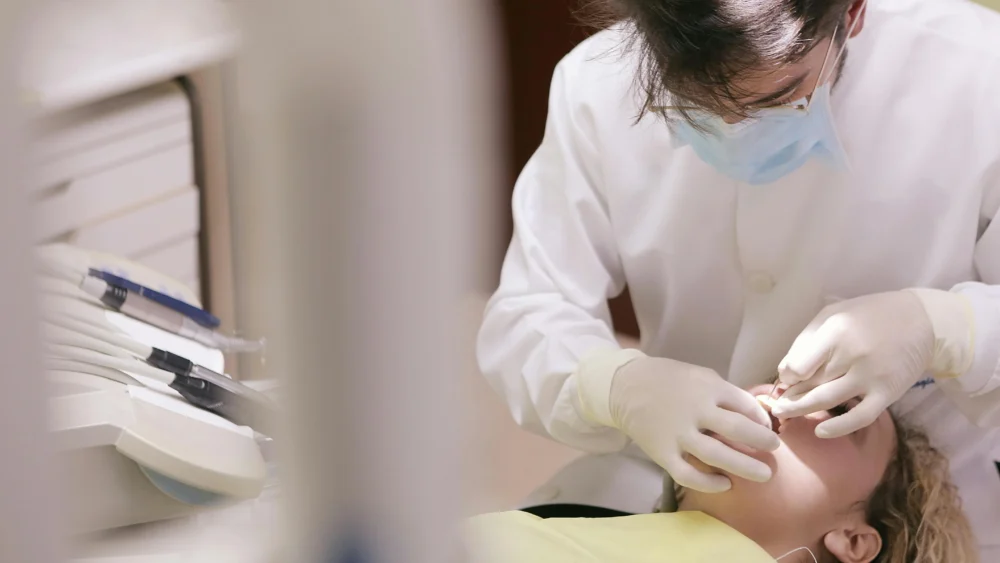Restoring damaged teeth is easier than you think.
- Identify types of damage: Understanding chips, cracks, and decay.
- Recognize early signs: Spot symptoms to treat damage early.
- Explore treatments: Learn about fillings, crowns, and veneers.
Follow these steps to restore damaged teeth effectively.
Understanding Tooth Damage
Tooth damage can adversely impact your oral health, appearance, and overall well-being. At My New Teeth, we understand how frustrating and painful it can be to deal with dental issues. The types of tooth damage can vary widely, but they typically include chips, cracks, decay, and enamel erosion.
Types of Tooth Damage
- Chips and Cracks: Minor damage like chips often occurs from biting down on hard foods or accidental impacts. Cracks can be more severe, resulting from trauma or grinding of teeth. Chips and cracks can cause pain, especially when exposed to cold or hot substances.
- Tooth Decay: This common issue stems from the buildup of plaque, which turns sugars into acids that erode tooth enamel. Decay can progress from light discoloration to cavities, significantly affecting both the function and aesthetics of the tooth.
- Enamel Erosion: Enamel, the hard outer surface of the tooth, can gradually wear down due to acidic foods, beverages, or even certain medical conditions. When enamel is eroded, it can lead to increased sensitivity and higher risk of decay.
Local Impact in Lefroy
Living in Lefroy, dental health is a priority for many. Local factors such as diet, water quality, and access to dental care can influence the prevalence and severity of tooth damage. Specific dietary habits in Lefroy might pose risks that require particular attention and tailored dental care strategies.
Consequences of Ignoring Tooth Damage
Failure to address tooth damage promptly can lead to more significant dental issues, including severe pain, infections, and even tooth loss. Ignoring early signs can result in more complex and costly treatments in the future.
Early Signs of Tooth Damage
Recognizing the early symptoms of tooth damage is crucial. By identifying these signs, you can seek timely intervention and prevent further deterioration.
Common Early Symptoms
- Sensitivity: Experiencing pain or discomfort when consuming hot, cold, or sweet foods is often an early sign of enamel erosion or decay.
- Discoloration: Dark spots or staining on teeth can indicate decay. These changes in color should not be ignored, as they can signify deeper issues.
- Pain: Persistent pain when chewing or touching the tooth suggests potential damage like a crack, cavity, or infection.
- Visible Damage: Chips, cracks, or rough edges on a tooth are visible signs that may require immediate attention.
Why Early Detection Matters
Early detection allows for less invasive treatments. For instance, identifying a small cavity early can provide the opportunity to treat it with a simple filling, rather than waiting until a more complex procedure like a root canal is necessary.
Lefroy’s Dental Health Vigilance
In Lefroy, ensuring routine dental check-ups and being aware of these early signs can be particularly effective in maintaining oral health. The local community’s emphasis on preventive care helps recognize and treat dental issues before they escalate.
Professional Dental Treatments
Various professional treatments can effectively restore damaged teeth. Here are several options offered by dental professionals.
Dental Fillings
Dentists use fillings to repair cavities and minor cracks. Composite fillings, made from resin, match the color of your teeth and offer a natural appearance. This solution is best for small to medium-sized cavities.
Dental Crowns
Crowns are suitable for teeth with extensive damage. They cover and protect the remaining tooth structure. Crowns can be made from porcelain, ceramic, or metal, providing a durable and esthetically pleasing solution.
Veneers
Veneers are thin shells placed on the front surface of teeth. They can address issues like chips, minor cracks, discoloration, and gaps between teeth. Veneers can be made from porcelain or resin composite, enhancing the appearance and function of damaged teeth.
Root Canals
When decay or damage reaches the pulp of the tooth, a root canal might be necessary. This procedure involves removing the infected or damaged pulp, cleaning the inside of the tooth, and sealing it. Afterward, a crown is often placed to restore functionality and appearance.
Implants and Bridges
For severe cases where a tooth is beyond repair or has been lost, dental implants and bridges offer a solution. Implants involve placing a titanium post in the jawbone, which acts as a root for the replacement tooth. Bridges fill the gap where teeth are missing, using adjacent teeth for support.
Protecting Your Teeth in Lefroy
In Lefroy, you have access to advanced dental treatments. Local dental clinics, like My New Teeth, provide state-of-the-art procedures that cater to both minor and severe dental issues, ensuring personalized and effective care.
At-Home Care and Remedies
Taking care of your teeth at home can prevent minor damage from worsening and maintain overall oral health.
Daily Oral Hygiene
- Brush Regularly: Brush your teeth at least twice a day using fluoride toothpaste. This helps remove plaque and prevent decay.
- Floss Daily: Flossing removes food particles and plaque between teeth, where a toothbrush can’t reach.
- Mouthwash: Use an antibacterial mouthwash to reduce plaque and prevent gum disease.
Remedies for Minor Damage
- Saltwater Rinse: A saltwater rinse can reduce inflammation and promote healing.
- Cold Compress: Apply a cold compress to the affected area to reduce pain and swelling.
- Clove Oil: Applying clove oil can offer relief from pain due to its natural anesthetic and antibacterial properties.
- Over-the-Counter Pain Relievers: Non-prescription pain relievers can help manage mild to moderate pain from tooth damage.
Dietary Considerations
- Limit Sugary Foods: Reduce consumption of sugary foods and beverages that contribute to plaque buildup and tooth decay.
- Eat a Balanced Diet: Ensure your diet includes plenty of fruits, vegetables, dairy, and other foods rich in vitamins and minerals that support oral health.
- Stay Hydrated: Drink plenty of water. It helps wash away food particles and maintains saliva production, which naturally protects against decay.
Practicing Good Habits in Lefroy
Residents of Lefroy can benefit from incorporating these at-home practices into their daily routines. Local dietary habits, involving fresh produce and limited processed foods, can further enhance oral health.
Preventing Future Tooth Damage
Once you’ve addressed existing tooth damage, it’s crucial to take proactive measures to prevent future issues.
Maintain Proper Dental Hygiene
- Brush and Floss Regularly: Use fluoride toothpaste and floss daily to remove plaque and food particles.
- Use Mouthguards: If you play sports or grind your teeth at night, use a mouthguard to protect your teeth from damage.
- Regular Dental Check-Ups: Schedule regular visits to your dentist for professional cleanings and check-ups. This helps catch early signs of potential problems.
Dietary Choices
- Healthy Eating: Eat a diet rich in fruits, vegetables, lean proteins, and dairy products. Avoid excessive consumption of sugary snacks and acidic beverages.
- Hydration: Drinking water helps maintain saliva levels and washes away harmful bacteria and food particles.
Additional Measures
- Use Fluoride Products: Fluoride strengthens tooth enamel and helps prevent decay. Use fluoride toothpaste and consider professional fluoride treatments.
- Avoid Tobacco: Smoking and using other tobacco products can lead to gum disease, tooth decay, and oral cancer.
Community Health in Lefroy
Lefroy’s community focus on preventive care can significantly enhance overall dental health. Access to regular check-ups and professional advice helps maintain strong, healthy teeth, preventing future damage effectively.
By following these steps and staying vigilant about your oral health, you can restore damaged teeth and maintain a healthy smile for years to come.
Importance of Timely Dental Intervention
Timely dental intervention is crucial to prevent the exacerbation of tooth damage. My New Teeth emphasizes the importance of addressing dental issues at the earliest signs. Acting promptly ensures that minor problems don’t escalate into major, costly treatments.
Preventing Further Damage
When you address dental issues early, you effectively prevent further damage. For example:
- Decay: Left untreated, a small cavity can become a large one, potentially requiring more invasive treatments like root canals.
- Cracks and Chips: Minor cracks and chips might seem harmless but can worsen, leading to more significant structural damage and potential tooth loss.
Immediate Relief
Early intervention provides immediate relief from pain and discomfort. For example, if you have a visible crack or significant decay, timely treatment alleviates pain, preventing it from becoming a constant distraction or a source of significant stress.
Cost-Effective Management
Addressing dental issues early is often more cost-effective. Simple procedures like fillings and sealants are more affordable than complex treatments like crowns and implants. Preventing more serious issues also means fewer visits and less overall expenditure on dental care.
Maintaining Oral Health
By promptly treating damaged teeth, you maintain your overall oral health. Decay and damage can lead to gum disease and other oral health issues. Lefroy residents who prioritize timely dental visits often find it easier to maintain a healthy and beautiful smile.
Innovations in Dental Restoration
Dentistry continuously evolves, providing innovative solutions for tooth restoration. These advancements make treatments more efficient, effective, and comfortable.
CEREC Technology
CEREC (Chairside Economical Restoration of Esthetic Ceramics) technology allows for the creation of ceramic restorations in a single appointment. Lefroy residents benefit from this convenience as there is no need for multiple visits or temporary crowns.
Advanced Dental Implants
Modern dental implants have improved significantly in durability and appearance. Titanium or zirconium implants provide robust foundations for artificial teeth. Their biocompatibility ensures that they fuse well with the jawbone, mimicking natural tooth roots.
Resin Infiltration
Resin infiltration is a minimally invasive treatment for small cavities and initial decay stages. This method strengthens the affected tooth without extensive drilling, preserving more of your natural tooth structure.
Digital X-Rays and 3D Imaging
Digital X-rays and 3D imaging offer precision diagnostics. These technologies allow dentists to detect and address issues with unparalleled accuracy, ensuring optimal treatment outcomes.
Benefits for Lefroy Residents
With access to these advanced technologies, Lefroy residents can expect quicker, more precise, and more comfortable dental treatments. This means less time in the dentist’s chair and more time enjoying life with a healthy smile.
Selecting the Right Treatment for You
Choosing the best dental restoration method requires careful consideration of various factors. Your dentist will guide you through this process, ensuring you receive the most suitable and effective treatment.
Assessing the Extent of Damage
First, evaluate the extent of the damage. For example:
- Minor Chips and Cracks: Dental bonding or veneers might be the best choices.
- Moderate Structural Damage: Crowns or onlays can restore both function and appearance.
- Severe Damage or Missing Teeth: Dental implants or bridges may be required.
Considering Aesthetics
Your treatment choice should align with your aesthetic preferences. Options like composite fillings, porcelain veneers, and ceramic crowns can match the color of your natural teeth, providing a seamless appearance.
Evaluating Durability
Different materials offer varying levels of durability. While metal crowns are highly durable, they may not be aesthetically pleasing. Porcelain and composite materials, while looking more natural, may not withstand the same level of wear and tear.
Understanding Costs
Consider the cost implications of each treatment. While some options like dental bonding are less expensive, they may not last as long as more costly alternatives like crowns or implants. Discuss with your dentist to align your choices with your budget.
Importance of Professional Guidance
It’s essential to consult with a dental professional who can provide personalized advice based on your specific needs and circumstances. This ensures optimal results and long-term satisfaction with your treatment choice.
FAQs about Restoring Damaged Teeth
Q1: How long do dental restorations last?
Answer: The longevity of dental restorations varies. For instance, composite fillings may last up to 10 years, while crowns and implants can last several decades with proper care. Regular check-ups and good oral hygiene habits extend the lifespan of restorations.
Q2: Is the restoration process painful?
Answer: Most dental restoration procedures are not painful due to advanced techniques and effective anesthesia. Patients might experience mild discomfort during recovery, but this is usually manageable with over-the-counter pain relievers.
Q3: How much do dental restorations cost?
Answer: Costs vary based on the type of restoration and the complexity of the procedure. For example, fillings are more affordable, while implants tend to be more expensive. Dental insurance may cover part of the cost, depending on your policy.
Q4: Can restorations match my natural teeth?
Answer: Yes, modern restorative materials can closely match the color and texture of your natural teeth. Composite resins, porcelain, and ceramic materials provide a natural look and blend seamlessly with your existing teeth.
Q5: Are there risks associated with dental restorations?
Answer: While dental restorations are generally safe, any surgical procedure comes with potential risks. These may include infection, sensitivity, or reaction to materials. However, these risks are minimal and manageable with proper care and professional supervision.
Conclusion
Restoring damaged teeth is essential for maintaining your oral health and overall well-being. By following the steps and considerations outlined here, you can effectively address tooth damage and prevent future issues. Regular dental check-ups, good oral hygiene, and timely intervention are key to keeping your smile healthy and beautiful. For residents in Lefroy seeking expert dental care, consult the professionals at My New Teeth to explore personalized treatment options tailored to your needs.



